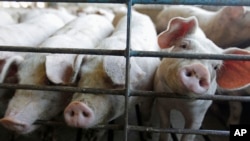The U.S. Food and Drug Administration (FDA) has approved a genetically modified pig to be used as food and for medical products.
The pig is genetically engineered to remove a sugar found on the surface of cells in many animals. The sugar, called alpha-gal, can cause allergic reactions in some people. The substance is used in many products, including medicines, food and cosmetics.
The American company behind the pig is United Therapeutics Corporation. It plans to develop medical products, such as blood thinners, that will not cause allergic reactions, company spokesman Dewey Steadman said.
There are also plans for the pig, called GalSafe, to be sold as food. Steadman, however, said the company does not know when it might be able to secure an agreement with a meat producer to process and sell it.
Steadman noted that the meat allergy the pig aims to avoid is not yet considered a major issue. “It's known, but it's not well known," he said.
Health researchers do not fully understand how the allergy develops. But it has been linked to bites from some kinds of ticks. In 2009, there were 24 reported cases. But more recent estimates from the U.S. Department of Health and Human Services found the number to be more than 5,000 cases.
Unlike other food allergies, alpha-gal reactions usually happen several hours after eating beef, pork or lamb - making it difficult to recognize.
Jaydee Hanson is the policy director for the Center for Food Safety. He told The Associated Press that meat from the genetically modified pigs was not tested in people with the allergies. “You’re offering it up as something they can eat, without knowing whether it (helps) their allergy,” Hanson said.
The FDA said it did not examine allergy-specific food safety because the company’s request for approval did not include data on preventing such reactions.
The Center for Food Safety brought legal action against the FDA over the first genetically modified animal the agency approved for food – a salmon. That approval was for a fish that was engineered to grow faster. The group said it is still examining the agency's decision on the GalSafe pig, which was announced December 14.
Greg Jaffe is with the Center for Science in the Public Interest. He told the AP the FDA's approval of the GalSafe pig is concerning because it came without a chance for public comment. “Nobody was given notice, and all of a sudden there’s an approved animal," he said.
United Therapeutics did not describe the exact process it used to genetically engineer the animal. Jaffe said the pig was produced by removing a gene responsible for producing the sugar and adding another that serves as a marker for the silenced gene.
Jaffe noted that he does not know if rules exist on how pork from genetically modified pigs would need to be labeled to be sold in stores.
Steadman said the company’s pigs would be more difficult to produce than other pigs for meat because of requirements covering how they must be kept and slaughtered. He said there are currently about 25 GalSafe pigs at a farm in Iowa.
Steadman said one of the company’s long term goals is to combine the genetic modification with other changes. The goal is to make the animal organs acceptable for transplant into humans. For years, researchers have been looking into the idea of transplanting pig organs as a way to deal with shortages of donated human organs.
I’m Bryan Lynn.
The Associated Press reported on this story. Bryan Lynn adapted the report for VOA Learning English. Mario Ritter, Jr. was the editor.
We want to hear from you. Write to us in the Comments Section, and visit our Facebook page.
______________________________________________________________
Words in This Story
modify – v. to change a part of something without changing other parts
allergic – adj. having an allergy, a medical condition that causes someone to become sick after coming into contact with something that is harmless to most people
cosmetics – n. something put on the face to improve a person’s appearance
notice – n. a written statement that brings attention to something
label – v. to put writing on something to identify what it is and provide additional information
slaughter – v. to kill an animal for food
transplant – v. a medical operation in which an unhealthy organ is replaced with a healthy one





